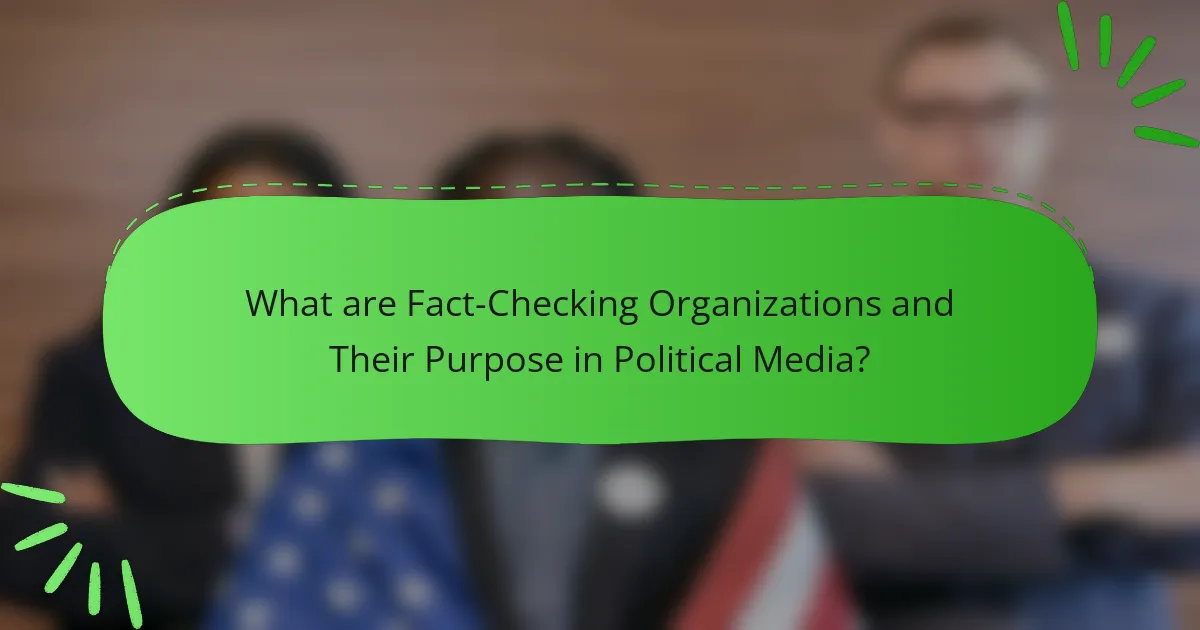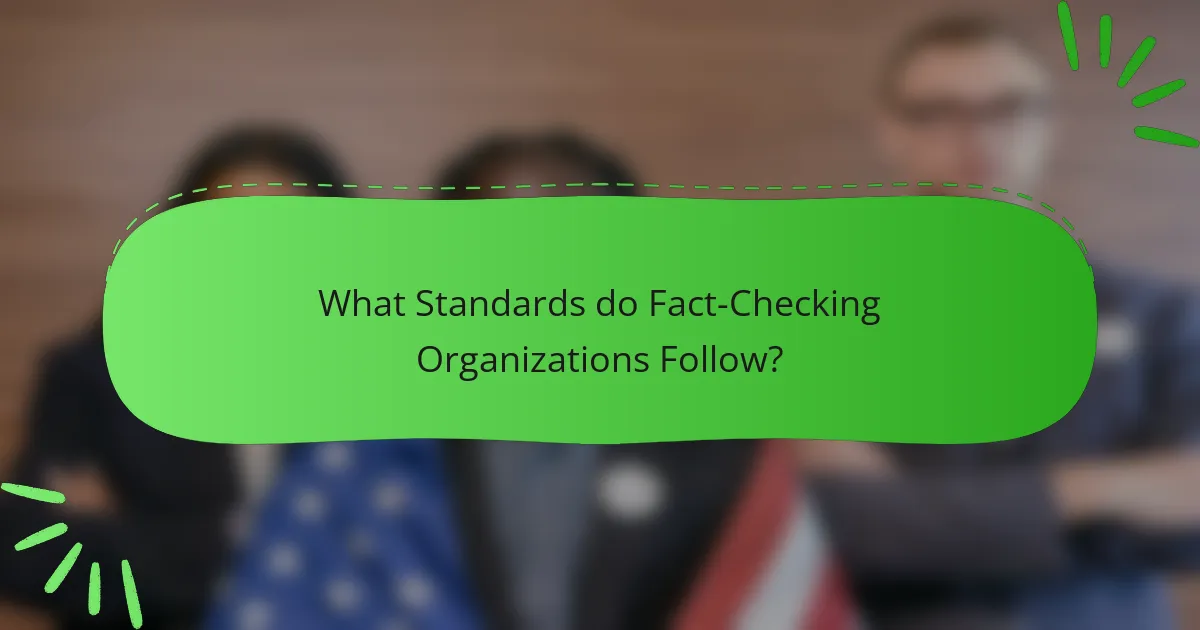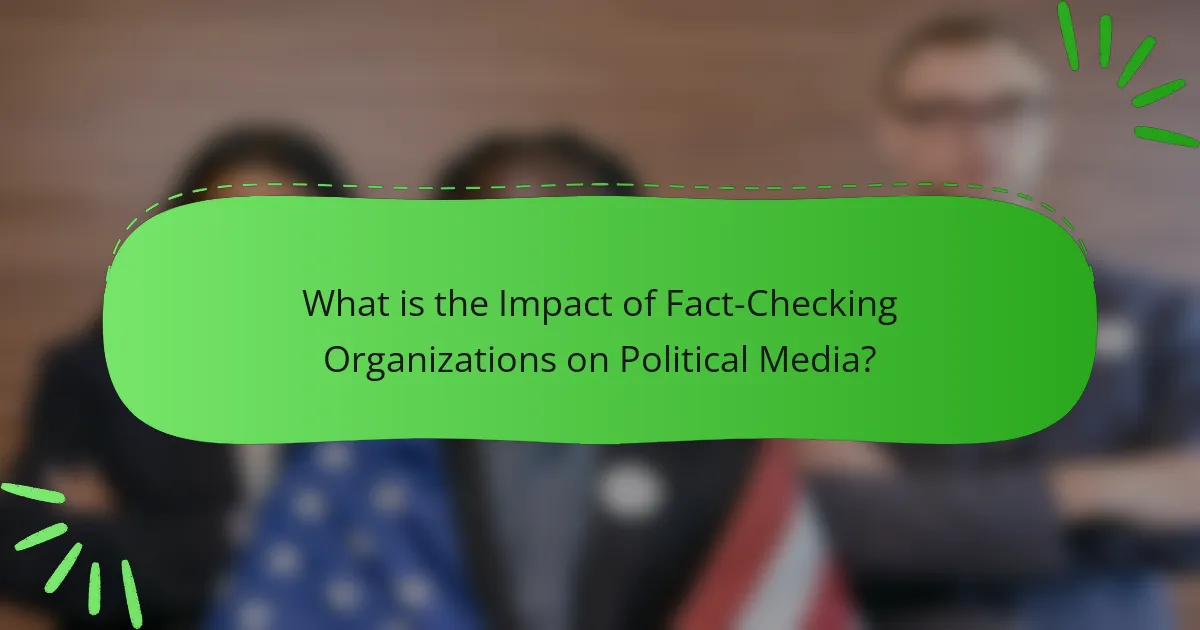Fact-checking organizations are independent entities dedicated to verifying the accuracy of claims in political media, with the goal of combating misinformation and promoting accountability among public figures. These organizations assess statements from politicians, media outlets, and influential sources, providing evidence-based evaluations that help the public differentiate between factual information and falsehoods. By adhering to rigorous standards of transparency, impartiality, and accuracy, many of these organizations are members of the International Fact-Checking Network (IFCN). Research indicates that their work not only enhances public trust in political discourse but also reduces the spread of false information, ultimately shaping informed political dialogue.

What are Fact-Checking Organizations and Their Purpose in Political Media?
Fact-checking organizations are independent entities that verify the accuracy of claims made in political media. Their primary purpose is to combat misinformation and promote accountability among public figures. They assess statements made by politicians, media outlets, and other influential sources. By providing evidence-based evaluations, they help the public discern factual information from falsehoods. Research indicates that fact-checking can improve public knowledge and reduce the spread of false information. For instance, a study by the Pew Research Center found that fact-checking can positively influence audience perceptions of political discourse. These organizations play a crucial role in maintaining the integrity of political communication.
How do Fact-Checking Organizations operate within the political media landscape?
Fact-checking organizations operate by verifying claims made in political discourse. They assess the accuracy of statements from politicians, media, and public figures. These organizations utilize a rigorous methodology, including research, sourcing, and evidence evaluation. They categorize findings into ratings such as true, false, or misleading. This process enhances transparency in political communication. Fact-checking organizations often publish their findings online for public access. Their work aims to combat misinformation in the political media landscape. Studies show that fact-checking can influence public perception and behavior.
What processes do Fact-Checking Organizations use to verify claims?
Fact-checking organizations verify claims through a systematic process. They begin by identifying the claim to be checked. Next, they gather relevant evidence from reliable sources. This may include academic research, official documents, and expert interviews. Organizations then analyze the evidence against the claim. They assess the credibility and context of the sources used. After evaluation, a verdict is reached, categorizing the claim as true, false, or misleading. Finally, the findings are published, often accompanied by explanations and references. This methodical approach ensures transparency and accountability in the verification process.
Who are the key players involved in fact-checking?
Key players involved in fact-checking include independent fact-checking organizations, journalists, and social media platforms. Independent organizations like FactCheck.org and PolitiFact assess the accuracy of public statements. Journalists often conduct fact-checking as part of their reporting process. Social media platforms employ fact-checkers to verify content shared on their sites. These players work collaboratively to combat misinformation. Their efforts are essential in maintaining public trust in information sources.
Why are Fact-Checking Organizations essential in political discourse?
Fact-checking organizations are essential in political discourse because they provide unbiased verification of claims made by public figures. These organizations help to combat misinformation and enhance the integrity of political communication. By evaluating statements against factual evidence, they promote accountability among politicians and media. Studies show that fact-checking can influence public opinion by correcting false narratives. For instance, a 2020 study by the Pew Research Center found that 73% of Americans believe fact-checking is important for democracy. This underscores their role in informing citizens and fostering informed debate.
What impact do they have on public perception of political information?
Fact-checking organizations significantly influence public perception of political information. They enhance credibility by verifying claims made by politicians and media. This verification process helps to counter misinformation. Research shows that exposure to fact-checked information leads to better informed citizens. For instance, a study by the Pew Research Center found that fact-checking increases public awareness of false claims. Consequently, this can lead to more informed voting decisions. Additionally, fact-checking organizations foster accountability among public figures. They encourage politicians to provide accurate information to maintain their reputation. Overall, these organizations play a vital role in shaping a more informed electorate.
How do they contribute to the accountability of political figures?
Fact-checking organizations contribute to the accountability of political figures by verifying claims made by them. These organizations assess the accuracy of statements using reliable sources. By exposing falsehoods, they hold politicians accountable for misinformation. Public exposure of inaccuracies can influence voter perception and behavior. Studies show that fact-checking can reduce the spread of false information. For instance, a 2017 study published in the journal “Political Communication” found that fact-checking increased public awareness of misinformation. This increased scrutiny encourages political figures to be more truthful in their communications. Ultimately, fact-checkers serve as a critical check on political narratives.

What Standards do Fact-Checking Organizations Follow?
Fact-checking organizations follow rigorous standards to ensure accuracy and credibility. These standards often include transparency about sources and methodology. They typically adhere to a code of ethics that emphasizes impartiality. Many organizations are members of the International Fact-Checking Network (IFCN), which outlines specific principles. These principles include a commitment to non-partisanship and fairness. Organizations also strive for accuracy by thoroughly verifying claims before publication. They often update their findings as new information emerges. This adherence to standards helps build public trust in their assessments.
How do Fact-Checking Organizations establish credibility?
Fact-checking organizations establish credibility through transparency, accuracy, and adherence to journalistic standards. They disclose their methodologies for verifying information. This includes outlining the sources they use and the processes they follow. Many organizations also publish corrections when errors occur. This commitment to accuracy builds trust with the public. Additionally, they often collaborate with reputable institutions and experts. For instance, organizations like PolitiFact and FactCheck.org are members of the International Fact-Checking Network. This affiliation requires adherence to a code of principles, enhancing their credibility. Research indicates that transparency in fact-checking processes significantly increases audience trust.
What are the common methodologies used in fact-checking?
Common methodologies used in fact-checking include source verification, evidence assessment, and expert consultation. Source verification involves checking the credibility of the information source. This can include cross-referencing with reliable databases or official documents. Evidence assessment entails analyzing the claims against available data or research studies. This ensures that the claims are substantiated by factual information. Expert consultation involves reaching out to knowledgeable individuals in relevant fields for their insights. These methodologies help maintain accuracy and credibility in the fact-checking process.
How do these methodologies ensure accuracy and impartiality?
Fact-checking methodologies ensure accuracy and impartiality through systematic verification processes. These processes involve cross-referencing claims with credible sources. Fact-checkers utilize a transparent methodology to evaluate the validity of information. They often rely on expert opinions to assess complex issues. Additionally, fact-checking organizations adhere to ethical guidelines that promote neutrality. This includes avoiding conflicts of interest and disclosing funding sources. Studies have shown that rigorous fact-checking improves public trust in media. For instance, a 2018 report by the American Press Institute found that fact-checked articles were perceived as more trustworthy.
What ethical guidelines govern Fact-Checking Organizations?
Fact-checking organizations are governed by ethical guidelines that ensure accuracy, transparency, and accountability. These organizations typically adhere to principles such as independence, impartiality, and the use of reliable sources. They aim to provide fair assessments without bias towards any political agenda. The International Fact-Checking Network (IFCN) outlines a code of principles that many organizations follow. This code emphasizes the importance of transparency in their methodology and funding sources. It also encourages corrections when errors are made. Adhering to these guidelines enhances credibility and trustworthiness in the information they provide.
How do these guidelines influence their reporting practices?
These guidelines shape reporting practices by establishing standards for accuracy and accountability. They require fact-checkers to verify claims before publication. This process enhances the credibility of the information presented. Adherence to these guidelines leads to more reliable reporting. Fact-checking organizations often publish their methodology, promoting transparency. This transparency fosters trust among audiences. The guidelines also encourage the use of diverse sources for verification. Ultimately, they influence the overall integrity of political media reporting.
What challenges do they face in maintaining these standards?
Fact-checking organizations face several challenges in maintaining their standards. One major challenge is the rapid spread of misinformation. This makes it difficult to keep up with false claims. Resources are often limited, impacting their ability to verify claims thoroughly. Additionally, there is pressure to produce timely results, which can compromise accuracy. Another issue is the potential bias in sources, which can affect the credibility of their findings. The political climate can also create obstacles, as organizations may face backlash from partisan groups. Lastly, maintaining transparency while protecting sensitive information poses a significant challenge. These factors collectively hinder the effectiveness of fact-checking organizations in upholding their standards.

What is the Impact of Fact-Checking Organizations on Political Media?
Fact-checking organizations significantly influence political media by promoting accuracy and accountability. They evaluate claims made by politicians and media outlets. This process helps to identify misinformation and enhances public trust. Research shows that fact-checking can reduce the spread of false information. A study by the Pew Research Center found that 68% of Americans believe fact-checking improves political discourse. Additionally, fact-checking organizations often provide context that helps audiences understand complex issues. Their work encourages journalists to adhere to higher standards of reporting. Overall, fact-checking organizations play a crucial role in shaping informed political dialogue.
How do Fact-Checking Organizations influence media reporting?
Fact-checking organizations influence media reporting by verifying claims made by public figures and media outlets. They provide accurate information that helps journalists maintain credibility. When these organizations publish fact-checks, they can prompt media outlets to correct misinformation. Studies show that media outlets often cite fact-checks to bolster their reporting. This practice encourages a culture of accountability in journalism. Additionally, fact-checking organizations raise public awareness about misinformation. They empower audiences to critically evaluate the information they consume. The presence of these organizations can lead to more responsible reporting standards across the media landscape.
What role do they play in shaping journalistic integrity?
Fact-checking organizations play a crucial role in shaping journalistic integrity. They verify the accuracy of claims made by public figures and media outlets. This process helps to hold journalists accountable for the information they present. By providing evidence-based assessments, these organizations foster transparency in reporting. Their work combats misinformation and promotes informed public discourse. Studies show that media outlets that engage with fact-checkers tend to improve their reporting standards. This collaboration enhances the credibility of journalism as a whole. Ultimately, fact-checking organizations reinforce the ethical standards of the media industry.
How do they affect the dissemination of misinformation?
Fact-checking organizations reduce the dissemination of misinformation by verifying claims before they spread. They analyze statements made by public figures and media outlets. When misinformation is identified, these organizations publish corrections and clarifications. This process helps inform the public about inaccuracies. Research shows that fact-checking can significantly decrease the belief in false information. A study by the Pew Research Center found that 62% of Americans reported changing their views after seeing fact-checks. By holding sources accountable, they promote a more informed society. Their work contributes to greater public trust in media and political discourse.
What are the measurable outcomes of Fact-Checking efforts?
Measurable outcomes of fact-checking efforts include increased public knowledge and reduced misinformation. Studies show that fact-checking can lead to a significant improvement in the accuracy of public understanding. For example, a study by the Pew Research Center found that 62% of Americans reported changing their views after encountering fact-checked information.
Additionally, fact-checking can enhance the credibility of media organizations. Research from the American Press Institute indicates that audiences trust news sources that engage in fact-checking more than those that do not. Furthermore, fact-checking efforts can influence political behavior. A report published by the Knight Foundation noted that individuals exposed to fact-checked content were more likely to engage in informed discussions about political issues.
These outcomes demonstrate the effectiveness of fact-checking in promoting informed citizenry and enhancing media accountability.
How do Fact-Checking Organizations track their effectiveness?
Fact-checking organizations track their effectiveness through various metrics and methodologies. They often measure the accuracy of their claims against independent sources. This includes analyzing the rate of corrections or updates made to previously fact-checked statements. Additionally, they assess audience engagement and reach through web analytics and social media metrics. Surveys and feedback from users provide qualitative insights into their impact. Some organizations publish annual reports detailing their findings and methodologies. For instance, the International Fact-Checking Network (IFCN) encourages transparency in reporting. This approach helps establish credibility and accountability in the fact-checking process.
What case studies demonstrate their impact on political narratives?
Case studies demonstrating the impact of fact-checking organizations on political narratives include the 2016 U.S. Presidential Election and the 2017 French Presidential Election. During the 2016 U.S. election, organizations like PolitiFact and FactCheck.org debunked numerous false claims made by candidates. Their efforts helped shape public perception by providing accurate information. Research indicates that fact-checking increased voters’ ability to identify misinformation. In the 2017 French election, fact-checking initiatives countered false information spread on social media. This led to a more informed electorate and influenced the discourse surrounding candidates. These examples illustrate the significant role fact-checking organizations play in shaping political narratives.
What best practices can Fact-Checking Organizations adopt for greater effectiveness?
Fact-checking organizations can adopt several best practices for greater effectiveness. They should prioritize transparency in their methodologies. This includes clearly outlining how they verify claims and the sources they use. Engaging with the public can enhance credibility. Organizations should encourage feedback and address concerns from their audience. Collaboration with other fact-checkers can improve resource sharing and knowledge exchange. Utilizing data analytics can help identify trends in misinformation. Training staff in media literacy can enhance their ability to discern credible sources. Regularly updating findings ensures that the information remains relevant and accurate. These practices collectively strengthen the reliability and impact of fact-checking efforts.
Fact-checking organizations are independent entities dedicated to verifying the accuracy of claims made in political media, aiming to combat misinformation and promote accountability among public figures. This article explores their operational methodologies, key players, and the standards they adhere to, emphasizing their essential role in enhancing the integrity of political discourse. It also examines the impact of fact-checking on public perception, the accountability of political figures, and the overall effectiveness of these organizations in shaping informed political dialogue. Additionally, the article discusses challenges faced by fact-checking organizations and outlines best practices for improving their effectiveness in the media landscape.